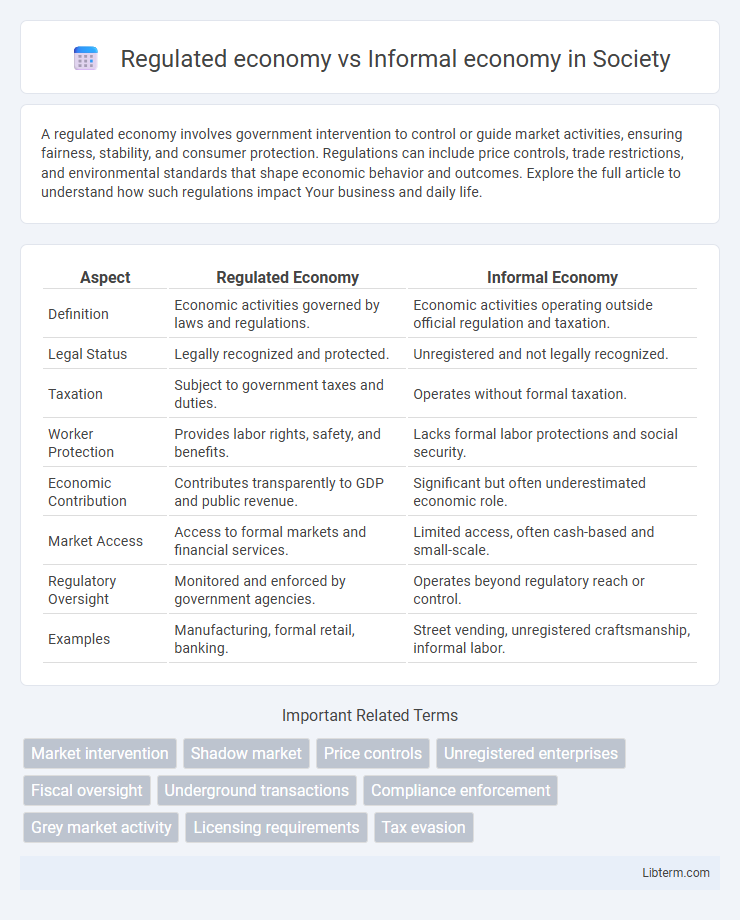A regulated economy involves government intervention to control or guide market activities, ensuring fairness, stability, and consumer protection. Regulations can include price controls, trade restrictions, and environmental standards that shape economic behavior and outcomes. Explore the full article to understand how such regulations impact Your business and daily life.
Table of Comparison
| Aspect | Regulated Economy | Informal Economy |
|---|---|---|
| Definition | Economic activities governed by laws and regulations. | Economic activities operating outside official regulation and taxation. |
| Legal Status | Legally recognized and protected. | Unregistered and not legally recognized. |
| Taxation | Subject to government taxes and duties. | Operates without formal taxation. |
| Worker Protection | Provides labor rights, safety, and benefits. | Lacks formal labor protections and social security. |
| Economic Contribution | Contributes transparently to GDP and public revenue. | Significant but often underestimated economic role. |
| Market Access | Access to formal markets and financial services. | Limited access, often cash-based and small-scale. |
| Regulatory Oversight | Monitored and enforced by government agencies. | Operates beyond regulatory reach or control. |
| Examples | Manufacturing, formal retail, banking. | Street vending, unregistered craftsmanship, informal labor. |
Defining the Regulated Economy
The regulated economy consists of formal economic activities governed by government policies, laws, and regulations ensuring compliance with labor standards, taxation, and environmental rules. It comprises sectors where businesses operate transparently with official records, contributing to national GDP and enabling access to financial services and legal protections. This economy promotes stability, consumer protection, and sustainable growth through structured oversight and enforcement mechanisms.
Understanding the Informal Economy
The informal economy encompasses economic activities that operate outside formal regulations, including unregistered businesses, casual labor, and undeclared income, making it difficult to measure accurately in national statistics. This sector often provides essential livelihoods for low-income populations and contributes significantly to employment, especially in developing countries where formal job opportunities are limited. Understanding the informal economy requires analyzing its impact on tax revenues, labor rights, and social protections while recognizing its role in economic resilience and survival strategies.
Key Characteristics of Regulated Economies
Regulated economies are characterized by government oversight, formal legal frameworks, and standardized financial reporting that ensure market stability and protect consumer rights. These economies feature structured taxation systems, labor laws, and business regulations that promote transparency and accountability. State intervention often aims to balance economic growth with social welfare, differentiating regulated sectors from the informal economy's unregistered and untaxed activities.
Main Features of Informal Economies
Informal economies operate outside formal regulatory frameworks, characterized by unregistered businesses, unreported income, and lack of social security benefits. They typically involve cash transactions, flexible employment arrangements, and minimal government oversight, making taxation and labor law enforcement challenging. These economies play a crucial role in livelihood generation, especially in developing countries, but often lack access to credit, legal protections, and formal market opportunities.
Advantages of a Regulated Economy
A regulated economy ensures legal frameworks that protect consumers, workers, and investors, fostering economic stability and growth. Government oversight promotes fair competition, reduces corruption, and enhances tax revenues used for public services and infrastructure development. Regulatory systems also encourage sustainable business practices and social welfare by enforcing labor laws and environmental standards.
Benefits of the Informal Economy
The informal economy provides significant employment opportunities, especially for low-skilled workers who face barriers in the regulated economy. It facilitates flexible work arrangements and reduces unemployment by allowing people to engage in small-scale entrepreneurship without the costs of formal registration or taxation. This sector also fosters innovation and community resilience by enabling local trade and services that might be neglected by formal markets.
Challenges Faced by Regulated Economies
Regulated economies often face challenges such as bureaucratic inefficiencies, restrictive policies that hinder innovation, and the burden of compliance costs that can stifle small businesses. These obstacles may lead to slower economic growth, reduced competitiveness in global markets, and increased opportunities for corruption within regulatory frameworks. Balancing effective regulation with economic freedom remains a critical issue for governments aiming to foster sustainable development.
Risks and Drawbacks of Informal Economies
Informal economies pose significant risks including lack of legal protection, limited access to credit, and absence of social security benefits, increasing vulnerability for workers. These economies often suffer from tax evasion, reducing government revenue and undermining public services. Moreover, informal sectors face challenges in maintaining product quality and safety standards due to unregulated practices.
The Impact on Economic Growth and Development
Regulated economies benefit from formal institutions, legal frameworks, and tax systems that foster stable investment and sustainable economic growth through enhanced productivity and innovation. Informal economies, while providing essential employment and income for underserved populations, often lack access to credit, social protections, and formal market opportunities, which limits scalability and long-term development prospects. The balance between formal regulation and informal economic activities significantly influences national GDP growth rates, poverty reduction, and overall economic resilience.
Policy Approaches to Bridge the Gap
Policy approaches to bridge the gap between regulated and informal economies emphasize formalization incentives, such as simplified tax regimes, access to credit, and legal recognition for informal enterprises. Strengthening labor rights and social protection frameworks promotes worker inclusion while reducing informality. Investment in skills development and digital infrastructure facilitates smoother transitions into the regulated economy, enhancing overall economic stability and growth.
Regulated economy Infographic

 libterm.com
libterm.com